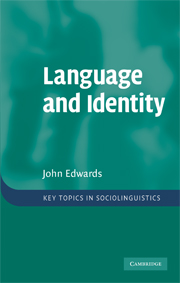Book contents
- Frontmatter
- Contents
- 1 Introduction
- 2 Identity, the individual and the group
- 3 Identifying ourselves
- 4 Language, dialect and identity
- 5 Dialect and identity: beyond standard and nonstandard
- 6 Language, religion and identity
- 7 Language, gender and identity
- 8 Ethnicity and nationalism
- 9 Assessments of nationalism
- 10 Language and nationalism
- 11 Language planning and language ecology
- Glossary
- Notes
- References
- Index
- References
2 - Identity, the individual and the group
Published online by Cambridge University Press: 05 June 2012
- Frontmatter
- Contents
- 1 Introduction
- 2 Identity, the individual and the group
- 3 Identifying ourselves
- 4 Language, dialect and identity
- 5 Dialect and identity: beyond standard and nonstandard
- 6 Language, religion and identity
- 7 Language, gender and identity
- 8 Ethnicity and nationalism
- 9 Assessments of nationalism
- 10 Language and nationalism
- 11 Language planning and language ecology
- Glossary
- Notes
- References
- Index
- References
Summary
INTRODUCTION
When I published a book called Language, Society and Identity in 1985, the final word in the title was not a particularly common one in the social-scientific literature. There had, of course, existed all sorts of studies of ethnic and national affiliation – largely from political and historical perspectives – but it is only in the last few decades that studies of identity have really come into their own. Gleason (1983) argues that this emergence was fuelled in part by the writings of the neo-Freudian Erik Erikson (1968), and it is certainly the case that his writings in the 1950s and 1960s put identity development (and identity ‘crisis’) in the spotlight. More subtly, Erikson's work situated these individual phenomena in their social contexts. Besides that, he was a pioneer in what came to be known as psychohistory, with notable biographies of Luther, Gandhi and other important figures. Erikson's work thus provided a psychological addition to earlier studies of ‘groupness’, an addition that stressed identity in context. It is not surprising, then, that Gleason reports the gradual emergence of entries relating to identity in social science encyclopaedias of the 1960s – from what had been a virtually complete absence a generation earlier.
As Joseph (2004) has noted, the early 1980s saw the appearance of important studies focusing on the linguistic aspects of identity. He mentions Gumperz's (1982) important collection on language and social identity, as well as Le Page and Tabouret-Keller's (1985) monograph on the subject.
- Type
- Chapter
- Information
- Language and IdentityAn introduction, pp. 15 - 33Publisher: Cambridge University PressPrint publication year: 2009



